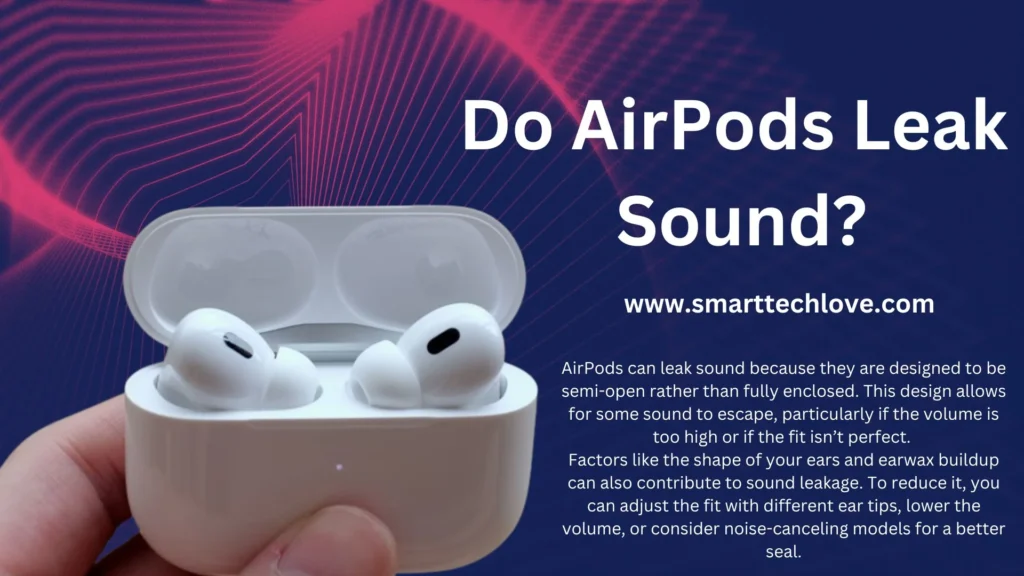When it comes to wireless earbuds, one common question users often ask is, “Do AirPods leak sound?” The design and functionality of AirPods are tailored to offer a blend of convenience and audio quality, but their semi-open nature means that some sound can escape into the environment.
This can be particularly noticeable in quiet or shared spaces, where even minimal leakage might become a concern.
Understanding how and why AirPods may leak sound can help users make informed choices about their listening habits and explore potential solutions to enhance their overall audio experience.
Understanding Sound Leakage
Sound leakage occurs when the audio playing through your headphones or earbuds escapes into the environment around you.
Instead of all the sound being directed into your ears, some of it spills out, potentially disturbing those nearby.
This is a common issue with many types of headphones, especially those that don’t completely seal off the ear.
When it comes to AirPods, sound leakage can be influenced by several factors, including the design of the AirPods, the volume level you’re using, and how well the AirPods fit in your ears.

Do Airpods Leak Sound?
AirPods can leak sound because they are designed to be semi-open rather than fully enclosed. This design allows for some sound to escape, particularly if the volume is too high or if the fit isn’t perfect.
Factors like the shape of your ears and earwax buildup can also contribute to sound leakage. To reduce it, you can adjust the fit with different ear tips, lower the volume, or consider noise-canceling models for a better seal.
Design and Sound Leakage
The design of the AirPods plays a significant role in how much sound leaks out.
1. AirPods (1st and 2nd Generation) and AirPods (3rd Generation)
The original AirPods and the third-generation AirPods feature an open design. This means they sit just inside your ear without creating a tight seal.
While this design is comfortable and allows you to stay aware of your surroundings, it also makes sound leakage more likely. Because there isn’t a snug seal, some of the sound can escape, especially at higher volumes.
2. AirPods Pro
The AirPods Pro, on the other hand, come with silicone ear tips that fit snugly into your ear canal, creating a seal that helps to keep the sound in and external noise out.
This design significantly reduces sound leakage compared to the original AirPods. However, it’s important to note that no in-ear headphones can completely eliminate sound leakage, especially if the volume is turned up high.
How to Minimize or Eliminate Sound Leakage?
While some sound leakage is inevitable with AirPods, especially in very quiet environments, there are a few things you can do to minimize it:
1. Adjust the Fit: As mentioned earlier, a proper fit is crucial in reducing sound leakage. If you’re using AirPods Pro, make sure you’ve selected the correct ear tip size. For the original and third-generation AirPods, try adjusting the position of the earbuds in your ear to see if that helps reduce leakage.
2. Lower the Volume: The simplest way to reduce sound leakage is to lower the volume. Not only does this help keep your audio private, but it’s also better for your hearing in the long run.
3. Use Noise-Canceling Features: If you’re using AirPods Pro, take advantage of the Active Noise Cancellation (ANC) feature. ANC allows you to listen at lower volumes while still being able to hear your audio clearly. Lower volumes mean less sound leakage.
4. Choose the Right Environment: If you’re in a situation where you need to keep your audio private, such as in a quiet office or on public transportation, be mindful of your surroundings and adjust your volume accordingly.
When Sound Leakage Becomes a Problem
Sound leakage can become problematic in certain situations, especially if you’re in a quiet environment where others can easily hear your audio.
It can be distracting or annoying to those around you, and in some cases, it might even violate the etiquette of certain spaces, like libraries or shared workspaces.
If you find yourself frequently in situations where sound leakage is a concern, consider investing in AirPods Pro if you haven’t already.
The better fit and noise-canceling features can help reduce the chances of disturbing others with your audio.
Conclusion
AirPods can leak sound, but the extent of leakage depends on several factors, including the volume level, the design of the AirPods, and how well they fit in your ears.
While some sound leakage is inevitable, especially with the open design of the original and third-generation AirPods, there are steps you can take to minimize it.
By paying attention to the fit, adjusting the volume, and using noise-canceling features, you can enjoy your AirPods while keeping your audio more private.
Understanding how sound leakage works and taking steps to minimize it not only improves your listening experience but also helps you be considerate of those around you.
Whether you’re jamming out to your favorite tunes or catching up on a podcast, a few simple adjustments can make a big difference in how much sound escapes from your AirPods.
- Can An AirTag Notify You When It Moves? Need To Know - November 20, 2024
- How Do You Make An Air Conditioner Colder? Tips for Better Cooling - November 18, 2024
- Why Is My Air Conditioner Blowing Hot Air In My Car? Ultimate Guide - November 17, 2024
